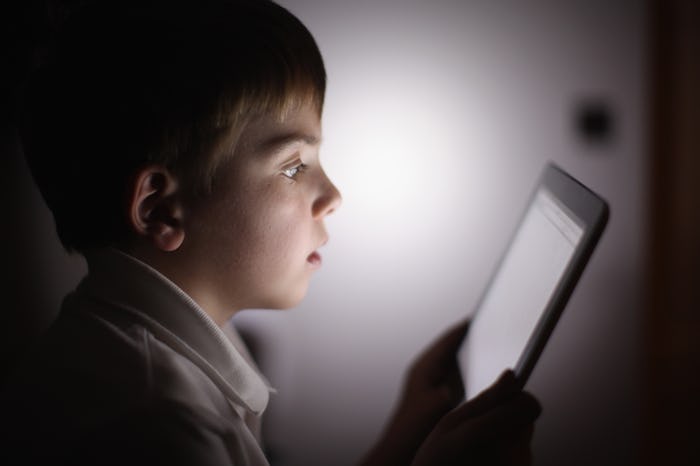Life

New Study Says This Is How You Can Tell If Your Kid Is Addicted To Screens
It is only natural for parents to be worried about everything for their kids — and modern technology is one of those things. These worries are both endless and so common: Are kids engaging in the right kind of content? Are they portraying themselves in a good light? And are they spending too much time on their phones or iPads? But there might be a solution to one of these worries, as a new study says that you can tell if your kid is addicted to screens, by doing this one thing — measuring how your child behaves without the screen in front of them.
The study, conducted by researchers at the University of Michigan, measured screen addiction in kids ages 4 to 11. By the end of the study, the researchers were able to determine that how the children use their iPads and phones — not how much they use them — was an indicator of emotional problems with screen attachment.
Sarah Domoff, a postdoctoral research fellow at the University of Michigan Center for Human Growth and Development, and the study's lead researcher explained in the study's press release published in Eureka Alert:
Our study has demonstrated that there is more to it than number of hours. What matters most is whether screen use causes other problems in life or has become an all-consuming activity.
This study's findings show that while parents might want to limit how much time their kid spends on electronic devices, they might also want to pay attention to the content their kid is consuming to their emotional well-being. Especially since kids screen time exposure is at an all-time high, according to Quartz.
As this study states, it is very possible for kids to be addicted to their devices. According to the New York Post, studies have found that devices affect the brain's frontal cortex and raises dopamine levels, which causes kids to form an attachment to their screen. When something feels so good, it is hard to remove yourself from it (like when you eat one chip from the bag and can't stop). But it is especially important for parents to acknowledge a possible addiction since it has been proven that screen time can have a major impact on a kid's mental health.
In 2014, a study conducted by researchers at the University of California, Los Angeles, found that kids who spent just five days without exposure to phones, televisions, and computers were better at reading emotions than kids who had regular access to same things, according to NPR. A 2010 study, according to CNET, found that kids who spent more than two hours of screen time a day had higher psychological difficulty. This past summer, one study found that prolonged screen time exposure for toddlers led to slower speech development, according to PBS News Hour.
As the study did point out, parents need to be aware and pay more attention to how kids are using their devices. Social media websites play a huge role in this. A 2011 study conducted by the American Academy of Pediatrics found that social media is not a "healthy environment" for kids and there is such a thing as "Facebook depression" Other studies, according to Forbes, have found that spending too much time on social media even triggers feelings of unhappiness and jealousy — thus leading to emotional and behavioral problems.
So what can be done to stop this? This most recent study found that parents need to be aware of the warning signs that their kids are giving off that might indicate something is wrong. For example, if screen time interferes with your kid's daily activities, causes conflict in the family, or is the only thing that brings your kid joy, according to the University of Michigan, this might be an indicator of a bigger problem.
Most parents know that they should watch their child's social media and device usage. But in addition to this, they should also pay extra attention to their child's behavior to determine if they are too attached to those screens.
Check out Romper's new video series, Romper's Doula Diaries:
Watch full episodes of Romper's Doula Diaries on Facebook Watch.